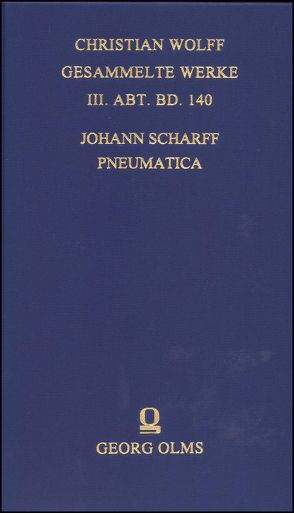
Johann Scharff (1595 – 1660) lehrte seit 1627 als Professor für Logik und Metaphysik an der Universität Wittenberg. 1638 übernahm er auch den Lehrstuhl für Ethik und ging 1649 in die Theologische Fakultät über.
Unter dem Begriff Pneumatik oder Pneumatologie verstand man im 17. Jahrhundert die Lehre von den immateriellen und vernunftbegabten, ungeschaffenen wie geschaffenen, Geistwesen im Unterschied zur Körper-Substanz. Sie gliedert sich in eine allgemeine Pneumatik, die das allen „Geistern“ Gemeinsame behandelt, und in eine spezielle Pneumatik, die sich mit Gott, mit den geschaffenen Geistwesen oder Engeln und schließlich mit der menschlichen Vernunftseele befasst.
Diese Disziplin hat Jakob Martini, Scharffs Lehrer an der Universität Wittenberg, zuerst als speziellen Teil der Metaphysik systematisch behandelt. Scharff hat die Pneumatik sodann erstmals zu einer literarischen Gattung erhoben und als Wissenschaft zwischen Ontologie und Physik etabliert, die im Laufe des 17. Jahrhunderts zahlreiche weitere Darstellungen erfahren hat. Scharffs Schrift wurde auch noch im 18. Jahrhundert bei Leibniz und vor allem bei Wolff rezipiert, wo die Pneumatik in die Psychologie einerseits und die natürliche Theologie andererseits einmündet.****************Johann Scharff (1595-1660) became Professor of Logic and Metaphysics at the University of Wittenberg in 1627. In 1638 he also took over the chair of Ethics and in 1649 moved to the Faculty of Theology.
In the 16th century the term pneumatics or pneumatology referred to the study of immaterial and intelligent, created and uncreated spiritual being as opposed to physical substance. It was divided into general pneumatics which dealt with all ‘spirits’ in general and special pneumatics which was concerned with God, with created spiritual beings or angels, and with the rational human soul. Jakob Martini, Scharff’s teacher at the University of Wittenberg, initially treated this discipline systematically as a special part of metaphysics. It was Scharff who first raised pneumatics to the status of a literary genre and established it as a science positioned between ontology and physics, which would be presented in many more forms in the course of the 17th century. Scharff’s work continued to resonate in the 18th century with Leibniz and particularly with Wolff, in whose work pneumatics fed into psychology on the one hand and natural theology on the other.
Aktualisiert: 2023-06-30
> findR *
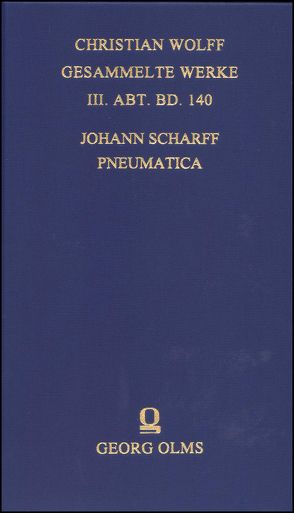
Johann Scharff (1595 – 1660) lehrte seit 1627 als Professor für Logik und Metaphysik an der Universität Wittenberg. 1638 übernahm er auch den Lehrstuhl für Ethik und ging 1649 in die Theologische Fakultät über.
Unter dem Begriff Pneumatik oder Pneumatologie verstand man im 17. Jahrhundert die Lehre von den immateriellen und vernunftbegabten, ungeschaffenen wie geschaffenen, Geistwesen im Unterschied zur Körper-Substanz. Sie gliedert sich in eine allgemeine Pneumatik, die das allen „Geistern“ Gemeinsame behandelt, und in eine spezielle Pneumatik, die sich mit Gott, mit den geschaffenen Geistwesen oder Engeln und schließlich mit der menschlichen Vernunftseele befasst.
Diese Disziplin hat Jakob Martini, Scharffs Lehrer an der Universität Wittenberg, zuerst als speziellen Teil der Metaphysik systematisch behandelt. Scharff hat die Pneumatik sodann erstmals zu einer literarischen Gattung erhoben und als Wissenschaft zwischen Ontologie und Physik etabliert, die im Laufe des 17. Jahrhunderts zahlreiche weitere Darstellungen erfahren hat. Scharffs Schrift wurde auch noch im 18. Jahrhundert bei Leibniz und vor allem bei Wolff rezipiert, wo die Pneumatik in die Psychologie einerseits und die natürliche Theologie andererseits einmündet.****************Johann Scharff (1595-1660) became Professor of Logic and Metaphysics at the University of Wittenberg in 1627. In 1638 he also took over the chair of Ethics and in 1649 moved to the Faculty of Theology.
In the 16th century the term pneumatics or pneumatology referred to the study of immaterial and intelligent, created and uncreated spiritual being as opposed to physical substance. It was divided into general pneumatics which dealt with all ‘spirits’ in general and special pneumatics which was concerned with God, with created spiritual beings or angels, and with the rational human soul. Jakob Martini, Scharff’s teacher at the University of Wittenberg, initially treated this discipline systematically as a special part of metaphysics. It was Scharff who first raised pneumatics to the status of a literary genre and established it as a science positioned between ontology and physics, which would be presented in many more forms in the course of the 17th century. Scharff’s work continued to resonate in the 18th century with Leibniz and particularly with Wolff, in whose work pneumatics fed into psychology on the one hand and natural theology on the other.
Aktualisiert: 2023-06-30
> findR *
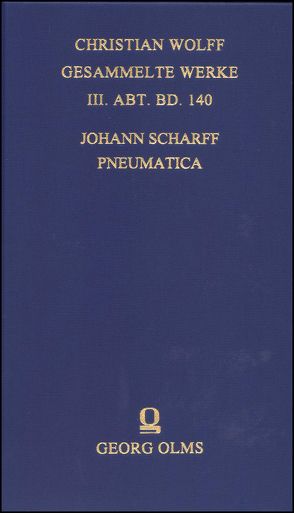
Johann Scharff (1595 – 1660) lehrte seit 1627 als Professor für Logik und Metaphysik an der Universität Wittenberg. 1638 übernahm er auch den Lehrstuhl für Ethik und ging 1649 in die Theologische Fakultät über.
Unter dem Begriff Pneumatik oder Pneumatologie verstand man im 17. Jahrhundert die Lehre von den immateriellen und vernunftbegabten, ungeschaffenen wie geschaffenen, Geistwesen im Unterschied zur Körper-Substanz. Sie gliedert sich in eine allgemeine Pneumatik, die das allen „Geistern“ Gemeinsame behandelt, und in eine spezielle Pneumatik, die sich mit Gott, mit den geschaffenen Geistwesen oder Engeln und schließlich mit der menschlichen Vernunftseele befasst.
Diese Disziplin hat Jakob Martini, Scharffs Lehrer an der Universität Wittenberg, zuerst als speziellen Teil der Metaphysik systematisch behandelt. Scharff hat die Pneumatik sodann erstmals zu einer literarischen Gattung erhoben und als Wissenschaft zwischen Ontologie und Physik etabliert, die im Laufe des 17. Jahrhunderts zahlreiche weitere Darstellungen erfahren hat. Scharffs Schrift wurde auch noch im 18. Jahrhundert bei Leibniz und vor allem bei Wolff rezipiert, wo die Pneumatik in die Psychologie einerseits und die natürliche Theologie andererseits einmündet.****************Johann Scharff (1595-1660) became Professor of Logic and Metaphysics at the University of Wittenberg in 1627. In 1638 he also took over the chair of Ethics and in 1649 moved to the Faculty of Theology.
In the 16th century the term pneumatics or pneumatology referred to the study of immaterial and intelligent, created and uncreated spiritual being as opposed to physical substance. It was divided into general pneumatics which dealt with all ‘spirits’ in general and special pneumatics which was concerned with God, with created spiritual beings or angels, and with the rational human soul. Jakob Martini, Scharff’s teacher at the University of Wittenberg, initially treated this discipline systematically as a special part of metaphysics. It was Scharff who first raised pneumatics to the status of a literary genre and established it as a science positioned between ontology and physics, which would be presented in many more forms in the course of the 17th century. Scharff’s work continued to resonate in the 18th century with Leibniz and particularly with Wolff, in whose work pneumatics fed into psychology on the one hand and natural theology on the other.
Aktualisiert: 2023-06-30
> findR *
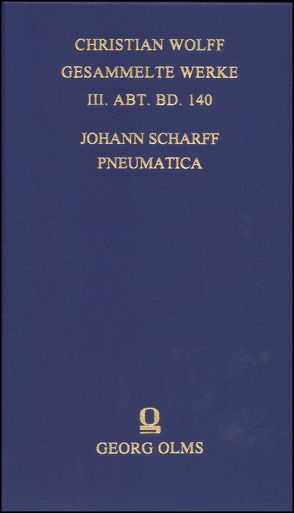
Johann Scharff (1595 – 1660) lehrte seit 1627 als Professor für Logik und Metaphysik an der Universität Wittenberg. 1638 übernahm er auch den Lehrstuhl für Ethik und ging 1649 in die Theologische Fakultät über.
Unter dem Begriff Pneumatik oder Pneumatologie verstand man im 17. Jahrhundert die Lehre von den immateriellen und vernunftbegabten, ungeschaffenen wie geschaffenen, Geistwesen im Unterschied zur Körper-Substanz. Sie gliedert sich in eine allgemeine Pneumatik, die das allen „Geistern“ Gemeinsame behandelt, und in eine spezielle Pneumatik, die sich mit Gott, mit den geschaffenen Geistwesen oder Engeln und schließlich mit der menschlichen Vernunftseele befasst.
Diese Disziplin hat Jakob Martini, Scharffs Lehrer an der Universität Wittenberg, zuerst als speziellen Teil der Metaphysik systematisch behandelt. Scharff hat die Pneumatik sodann erstmals zu einer literarischen Gattung erhoben und als Wissenschaft zwischen Ontologie und Physik etabliert, die im Laufe des 17. Jahrhunderts zahlreiche weitere Darstellungen erfahren hat. Scharffs Schrift wurde auch noch im 18. Jahrhundert bei Leibniz und vor allem bei Wolff rezipiert, wo die Pneumatik in die Psychologie einerseits und die natürliche Theologie andererseits einmündet.****************Johann Scharff (1595-1660) became Professor of Logic and Metaphysics at the University of Wittenberg in 1627. In 1638 he also took over the chair of Ethics and in 1649 moved to the Faculty of Theology.
In the 16th century the term pneumatics or pneumatology referred to the study of immaterial and intelligent, created and uncreated spiritual being as opposed to physical substance. It was divided into general pneumatics which dealt with all ‘spirits’ in general and special pneumatics which was concerned with God, with created spiritual beings or angels, and with the rational human soul. Jakob Martini, Scharff’s teacher at the University of Wittenberg, initially treated this discipline systematically as a special part of metaphysics. It was Scharff who first raised pneumatics to the status of a literary genre and established it as a science positioned between ontology and physics, which would be presented in many more forms in the course of the 17th century. Scharff’s work continued to resonate in the 18th century with Leibniz and particularly with Wolff, in whose work pneumatics fed into psychology on the one hand and natural theology on the other.
Aktualisiert: 2023-06-29
> findR *
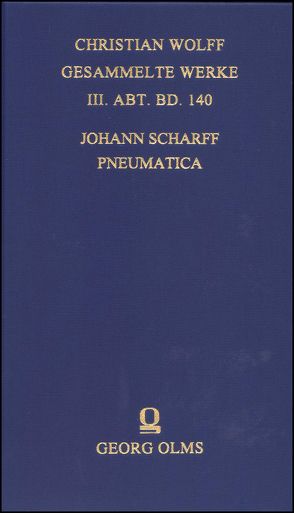
Johann Scharff (1595 – 1660) lehrte seit 1627 als Professor für Logik und Metaphysik an der Universität Wittenberg. 1638 übernahm er auch den Lehrstuhl für Ethik und ging 1649 in die Theologische Fakultät über.
Unter dem Begriff Pneumatik oder Pneumatologie verstand man im 17. Jahrhundert die Lehre von den immateriellen und vernunftbegabten, ungeschaffenen wie geschaffenen, Geistwesen im Unterschied zur Körper-Substanz. Sie gliedert sich in eine allgemeine Pneumatik, die das allen „Geistern“ Gemeinsame behandelt, und in eine spezielle Pneumatik, die sich mit Gott, mit den geschaffenen Geistwesen oder Engeln und schließlich mit der menschlichen Vernunftseele befasst.
Diese Disziplin hat Jakob Martini, Scharffs Lehrer an der Universität Wittenberg, zuerst als speziellen Teil der Metaphysik systematisch behandelt. Scharff hat die Pneumatik sodann erstmals zu einer literarischen Gattung erhoben und als Wissenschaft zwischen Ontologie und Physik etabliert, die im Laufe des 17. Jahrhunderts zahlreiche weitere Darstellungen erfahren hat. Scharffs Schrift wurde auch noch im 18. Jahrhundert bei Leibniz und vor allem bei Wolff rezipiert, wo die Pneumatik in die Psychologie einerseits und die natürliche Theologie andererseits einmündet.****************Johann Scharff (1595-1660) became Professor of Logic and Metaphysics at the University of Wittenberg in 1627. In 1638 he also took over the chair of Ethics and in 1649 moved to the Faculty of Theology.
In the 16th century the term pneumatics or pneumatology referred to the study of immaterial and intelligent, created and uncreated spiritual being as opposed to physical substance. It was divided into general pneumatics which dealt with all ‘spirits’ in general and special pneumatics which was concerned with God, with created spiritual beings or angels, and with the rational human soul. Jakob Martini, Scharff’s teacher at the University of Wittenberg, initially treated this discipline systematically as a special part of metaphysics. It was Scharff who first raised pneumatics to the status of a literary genre and established it as a science positioned between ontology and physics, which would be presented in many more forms in the course of the 17th century. Scharff’s work continued to resonate in the 18th century with Leibniz and particularly with Wolff, in whose work pneumatics fed into psychology on the one hand and natural theology on the other.
Aktualisiert: 2023-06-29
> findR *
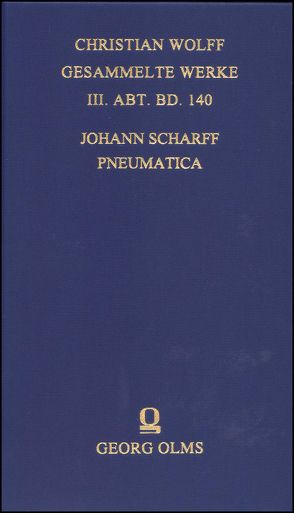
Johann Scharff (1595 – 1660) lehrte seit 1627 als Professor für Logik und Metaphysik an der Universität Wittenberg. 1638 übernahm er auch den Lehrstuhl für Ethik und ging 1649 in die Theologische Fakultät über.
Unter dem Begriff Pneumatik oder Pneumatologie verstand man im 17. Jahrhundert die Lehre von den immateriellen und vernunftbegabten, ungeschaffenen wie geschaffenen, Geistwesen im Unterschied zur Körper-Substanz. Sie gliedert sich in eine allgemeine Pneumatik, die das allen „Geistern“ Gemeinsame behandelt, und in eine spezielle Pneumatik, die sich mit Gott, mit den geschaffenen Geistwesen oder Engeln und schließlich mit der menschlichen Vernunftseele befasst.
Diese Disziplin hat Jakob Martini, Scharffs Lehrer an der Universität Wittenberg, zuerst als speziellen Teil der Metaphysik systematisch behandelt. Scharff hat die Pneumatik sodann erstmals zu einer literarischen Gattung erhoben und als Wissenschaft zwischen Ontologie und Physik etabliert, die im Laufe des 17. Jahrhunderts zahlreiche weitere Darstellungen erfahren hat. Scharffs Schrift wurde auch noch im 18. Jahrhundert bei Leibniz und vor allem bei Wolff rezipiert, wo die Pneumatik in die Psychologie einerseits und die natürliche Theologie andererseits einmündet.****************Johann Scharff (1595-1660) became Professor of Logic and Metaphysics at the University of Wittenberg in 1627. In 1638 he also took over the chair of Ethics and in 1649 moved to the Faculty of Theology.
In the 16th century the term pneumatics or pneumatology referred to the study of immaterial and intelligent, created and uncreated spiritual being as opposed to physical substance. It was divided into general pneumatics which dealt with all ‘spirits’ in general and special pneumatics which was concerned with God, with created spiritual beings or angels, and with the rational human soul. Jakob Martini, Scharff’s teacher at the University of Wittenberg, initially treated this discipline systematically as a special part of metaphysics. It was Scharff who first raised pneumatics to the status of a literary genre and established it as a science positioned between ontology and physics, which would be presented in many more forms in the course of the 17th century. Scharff’s work continued to resonate in the 18th century with Leibniz and particularly with Wolff, in whose work pneumatics fed into psychology on the one hand and natural theology on the other.
Aktualisiert: 2023-06-29
> findR *
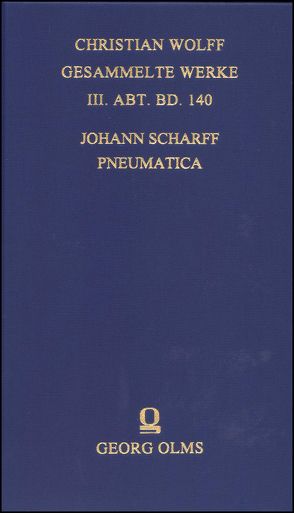
Johann Scharff (1595 – 1660) lehrte seit 1627 als Professor für Logik und Metaphysik an der Universität Wittenberg. 1638 übernahm er auch den Lehrstuhl für Ethik und ging 1649 in die Theologische Fakultät über.
Unter dem Begriff Pneumatik oder Pneumatologie verstand man im 17. Jahrhundert die Lehre von den immateriellen und vernunftbegabten, ungeschaffenen wie geschaffenen, Geistwesen im Unterschied zur Körper-Substanz. Sie gliedert sich in eine allgemeine Pneumatik, die das allen „Geistern“ Gemeinsame behandelt, und in eine spezielle Pneumatik, die sich mit Gott, mit den geschaffenen Geistwesen oder Engeln und schließlich mit der menschlichen Vernunftseele befasst.
Diese Disziplin hat Jakob Martini, Scharffs Lehrer an der Universität Wittenberg, zuerst als speziellen Teil der Metaphysik systematisch behandelt. Scharff hat die Pneumatik sodann erstmals zu einer literarischen Gattung erhoben und als Wissenschaft zwischen Ontologie und Physik etabliert, die im Laufe des 17. Jahrhunderts zahlreiche weitere Darstellungen erfahren hat. Scharffs Schrift wurde auch noch im 18. Jahrhundert bei Leibniz und vor allem bei Wolff rezipiert, wo die Pneumatik in die Psychologie einerseits und die natürliche Theologie andererseits einmündet.****************Johann Scharff (1595-1660) became Professor of Logic and Metaphysics at the University of Wittenberg in 1627. In 1638 he also took over the chair of Ethics and in 1649 moved to the Faculty of Theology.
In the 16th century the term pneumatics or pneumatology referred to the study of immaterial and intelligent, created and uncreated spiritual being as opposed to physical substance. It was divided into general pneumatics which dealt with all ‘spirits’ in general and special pneumatics which was concerned with God, with created spiritual beings or angels, and with the rational human soul. Jakob Martini, Scharff’s teacher at the University of Wittenberg, initially treated this discipline systematically as a special part of metaphysics. It was Scharff who first raised pneumatics to the status of a literary genre and established it as a science positioned between ontology and physics, which would be presented in many more forms in the course of the 17th century. Scharff’s work continued to resonate in the 18th century with Leibniz and particularly with Wolff, in whose work pneumatics fed into psychology on the one hand and natural theology on the other.
Aktualisiert: 2019-11-18
> findR *
MEHR ANZEIGEN
Bücher zum Thema Philosophie/Philosophie - Neuzeit
Sie suchen ein Buch über Philosophie/Philosophie - Neuzeit? Bei Buch findr finden Sie eine große Auswahl Bücher zum
Thema Philosophie/Philosophie - Neuzeit. Entdecken Sie neue Bücher oder Klassiker für Sie selbst oder zum Verschenken. Buch findr
hat zahlreiche Bücher zum Thema Philosophie/Philosophie - Neuzeit im Sortiment. Nehmen Sie sich Zeit zum Stöbern und finden Sie das
passende Buch für Ihr Lesevergnügen. Stöbern Sie durch unser Angebot und finden Sie aus unserer großen Auswahl das
Buch, das Ihnen zusagt. Bei Buch findr finden Sie Romane, Ratgeber, wissenschaftliche und populärwissenschaftliche
Bücher uvm. Bestellen Sie Ihr Buch zum Thema Philosophie/Philosophie - Neuzeit einfach online und lassen Sie es sich bequem nach
Hause schicken. Wir wünschen Ihnen schöne und entspannte Lesemomente mit Ihrem Buch.
Philosophie/Philosophie - Neuzeit - Große Auswahl Bücher bei Buch findr
Bei uns finden Sie Bücher beliebter Autoren, Neuerscheinungen, Bestseller genauso wie alte Schätze. Bücher zum
Thema Philosophie/Philosophie - Neuzeit, die Ihre Fantasie anregen und Bücher, die Sie weiterbilden und Ihnen wissenschaftliche
Fakten vermitteln. Ganz nach Ihrem Geschmack ist das passende Buch für Sie dabei. Finden Sie eine große Auswahl
Bücher verschiedenster Genres, Verlage, Autoren bei Buchfindr:
Sie haben viele Möglichkeiten bei Buch findr die passenden Bücher für Ihr Lesevergnügen zu entdecken. Nutzen Sie
unsere Suchfunktionen, um zu stöbern und für Sie interessante Bücher in den unterschiedlichen Genres und Kategorien
zu finden. Unter Philosophie/Philosophie - Neuzeit und weitere Themen und Kategorien finden Sie schnell und einfach eine Auflistung
thematisch passender Bücher. Probieren Sie es aus, legen Sie jetzt los! Ihrem Lesevergnügen steht nichts im Wege.
Nutzen Sie die Vorteile Ihre Bücher online zu kaufen und bekommen Sie die bestellten Bücher schnell und bequem
zugestellt. Nehmen Sie sich die Zeit, online die Bücher Ihrer Wahl anzulesen, Buchempfehlungen und Rezensionen zu
studieren, Informationen zu Autoren zu lesen. Viel Spaß beim Lesen wünscht Ihnen das Team von Buchfindr.






